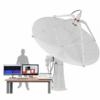Mon, Jul 10, 2017
Unveiled At Their Headquarters In Roveredo In Piano, Italy
An Italian firm has unveiled a new radio telescope that is targeted at the educational market, particularly high schools. Earlier this week, Prima Luce Lab unfolded its new long range radio telescope in view of those attending the event at their headquarters, but also to the world streaming it live online on their Facebook page.

"The whole spider line was born with schools and the educational system as a target," said Doctor Filippo Bradaschia, CEO and co-founder of Prima Luca Lab. "We wanted to manufacture a top notch radio telescope to be used by high schools and universities in any weather condition. Of course," he continued, "schools are our primary interest but we believe that it would be a useful asset for the scientific community as well."
Bradaschia said the Spider 300A gives the same performances of a professional radio telescope but it is compact both in size and cost. Such characteristics make it much more interesting for schools and universities. "The Spider 300A is just the beginning of our new generation of radio telescopes, we are already working on both software and hardware optional additions in order to enhance its performances," he said. "We are developing add-ons such as remote control or SEPI (Search for Extra Terrestrial Intelligence) applications." The CEO explained that the final goal is to create an array of telescopes forming together a larger antenna reaching professional capabilities.

The telescope comes with a 3 meters wide dish antenna. Working with 1.42Ghz frequency waves, it can be used during the day as well as at night. Its operation will not be affected by clouds, as this kind of radio waves can penetrate cloud banks providing the possibility to observe the cosmos in any weather condition. The Spider 300A has a fully waterproof framework and in case of strong winds the antenna automatically repositions itself in such a fashion as to give as little resistance as possible. These features and the sturdy framework make it possible to leave the telescope outside without the risk of damage.
Equipped with a 1024 channels spectrometer, having high gain and making little to none electronic noise, the Spider 300A can detect radio signals coming from many sources in the universe.
(Images provided with Prima Luce Labs news release)
More News
Aero Linx: Model Aeronautical Association of Australia MAAA clubs are about fun flying, camaraderie and community. For over 75 years, the MAAA has been Australia’s largest fl>[...]
Touchdown Zone Lighting Two rows of transverse light bars located symmetrically about the runway centerline normally at 100 foot intervals. The basic system extends 3,000 feet alon>[...]
“Discovery and innovation are central to our mission at Virgin Galactic. We’re excited to build on our successful record of facilitating scientific experiments in subor>[...]
How To Get A Story On Aero-TV News/Feature Programming How do I submit a story idea or lead to Aero-TV? If you would like to submit a story idea or lead, please contact Jim Campbel>[...]
Student Pilot Reported That During Rotation, “All Of A Sudden The Back Of The Plane Kicked To The Right..." Analysis: The student pilot reported that during rotation, “>[...]
 ANN's Daily Aero-Linx (05.02.24)
ANN's Daily Aero-Linx (05.02.24) ANN's Daily Aero-Term (05.02.24): Touchdown Zone Lighting
ANN's Daily Aero-Term (05.02.24): Touchdown Zone Lighting Aero-News: Quote of the Day (05.02.24)
Aero-News: Quote of the Day (05.02.24) ANN FAQ: Contributing To Aero-TV
ANN FAQ: Contributing To Aero-TV NTSB Final Report: Cirrus Design Corp SR20
NTSB Final Report: Cirrus Design Corp SR20




